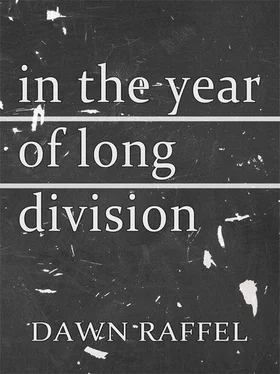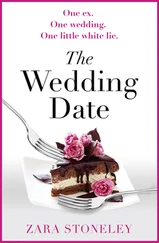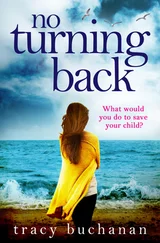Rust. Spit. Lotion. Spit and polish, spray and wax, and gabardine going dotty in a closet, smells, plugs, the smell of Mother, and starch, and rutted underfoot wood, patent leather and nails, bleach, blood, gum and balls of hair balls in the drain — this was our house.
We girls were squealing-clean.
Inside, we knew our number. We could count on it — wholesome, even, and Mother made three.
We were shy of nothing so much as the facts.
We were not of one mind. Those underhanded boys, our mother said, were throwing rocks and sticks in our direction. They were capable of damage. They had matches, those boys, and stink bombs and canes. Their wrists were thick and knobby. Growing boys, they were winging grenades at the stoops on both sides of the street, and there was recent talk of missiles.
“Poor, poor her,” our mother said, speaking of the mother of the boys. “It’s in the glands,” our mother said. “Pits — pits of apricots,” our mother had been overheard to say into the phone when we were busy overhearing. “Glands…. Bananas…. A holy hill of beans,” our mother said, “and not a man in clear sight.”
But whose heart was beating hardest?
This was in the year of falling and falling and falling snow. Day and night, night and day and afternoon — it did not matter. There were drifts above the height of our imaginings. Sisters, not twins, we were not the same in body and build, but in the alley in back, our booted feet went sliding higher in tandem than the various places where otherwise our heads might more rightly have been.
It was the year of hocus-pocus and underwater voodoo—“Do you do it, too?” my sister said — and making angels on our backs. We leaked. Boots and tights and shins, all dripping. Our jackets had been lacking. Slushy, and full of the smell of ourselves and of synthetic, sopping fleece, we poured our sorrows out to Mother. We exploded in sneezes, emptied our purses, slid weak ankles in the stream of the tap.
“Lukewarm,” our mother said, and not, as we had thought, hot.
The drain choked. We were mottled and tender and to blame for flowing over. We should have worn pants, our mother said.
Girls will be girls. We should have worn gloves for making pristine bricks.
Because those boys were building fortresses and hospitals. Headlong, in a rush of fresh construction, there was one of those boys erecting bases and silos and hotels with special access — or so we thought we’d heard.
It was the hard packing snow with slivered ice. It was good, we believed, for inflammations. It had quieted the air to punch-drunk.
Our ears rang.
Blue, in the insubstantial hours under covers, stray syllables between us were strange and often lost. Long halls wandered window-lit alone turned to blind and empty spaces, hushful and soft, and holding only the soft sounds of Mother on a late, blind line.
We sisters swapped our beds. Lonely, we took to stuffing pillows up high beneath our dresses, admired the effect and learned to squint. Mysterious machinery appeared beneath our windows. Those busy, industrious, and back-breaking boys were in possession of equipment of a glorious kind. We were glowing in reflection. But no one had a shovel.
We were snowed deep in.
School had been suspended, and this in the year of long division and remedial enrichment and lunch and petty cloakroom theft.
“Twice removed,” our mother said to who knew who and spoke of travel.
“Oh,” our mother said another time. “Oh, for the sun to heal the ache.”
We were hitting our studies at the sink.
“I should have been an old Chelsea dog,” our mother said. Or maybe not, for there was racket and distortion. We were occupied in brushing up on new zones of shame. We were crackerjack geographers. “Water, water everywhere,” my sister said, and this without a map.
The snowy street was in relief. It was a vision of bridges and hangars, struts. It was immaculate traction. There were viaducts and overpasses, loop-the-loop ramps. A scaffold-shadowed boy was propped hunching in a chairlike contraption, inventing the wheels. We saw a hat-snatching scuffle and a split-and-whistle wrestle on a bank. There was a flash of something foreign.
“Pity, pity her,” our mother said about the missing other mother, and spoke often of invasion and vitamins and cysts and escalation and nausea and pity.
There were more of those boys. There were more of those boys. There were more of those boys, of all ages and stripes. Everywhere we looked, those boys were there and there and there. On certain of their heads, the hair was white. They were limping and coughing and clinging from the rafters, faces pressing fleshy to the glass of our house. They had flattened their noses. They were armed. They were shooting down the chimney and pounding on the milk chute and dropping like flies by the slot for mail.
“Someone’s buzzing at the door,” my sister said. We were freshening up. In the mirror, we could see a strange relation. We could feel it in our marrow. We were not quite girls.
And where was Mother? Where was Mother in the hour when we needed her most?
Because the world was full of boys, and of full-fledged fellows. There were gentlemen of industry and corporals and serious lawyers. This would be no ordinary shirtsleeve street fight. A marching band was marching into view.
There was a rumble up and coming.
Brass horns blatted out “The Star-Spangled Banner.” There were body bags and drums, maneuvers. The air was turning misty and ballistic. We could smell it. An ambulance was screaming. Someone was insisting he was Swiss.
But who could answer? It was impossible to think. It was a blizzard of plaster and limbs. Clothes and blood and nails all flew, in and out of the house, in hotels and planes and hospitals — who cared and who could tell? The telephone was dead. A taste was in our mouths of something other than ourselves and we could sniff it on each other. Things were vanishing from inside out. Halls, the tub, the alley — there were bodies in the room in which we slept, a hit and rustle in a closet, and skeletons falling bone on bone on gabardine. Fur, sticks, bats, and holy hell came hailing down and down and down around our heads.
And then it was quiet.
And then it was level.
Silent, save a trickle.
The fellows — the men — were all gone. It appeared that they had packed up their bags and their cities and their tools and up and left.
We waited.
We knitted.
We received a scribbled card that said to wait. For they were staking out the globe. They were laying in foundations. They were rolling the steam to pave the milk white way, to pave the dazzling path for what was closest to our hearts, for what was swelling and floating and building — brain and heart and marrow — for the strangers, the sharers, quickening and kicking in the dark beneath our skin.
THE widow did not want to go in the boat. She said so, too, she did. Twice in the rapids, the widow said, that sun too hot, that Peshtigo water chafing her with rust and biting silt — bloat, the widow said, the river up, the boat bark weak.
But the man appeared not to have heard her. He was bailing something puddled out of the hull, spilling it onto the loose earth.
“We ought, too, to think of the boy,” the widow said.
“Ought what?” the man said.
“Him not half-grown,” the widow said, “the Peshtigo drunk, him — the boy — head-over-heels into water, rock, blood,” she said. “Bloody, bloody river.”
“A story, that,” the man said, not stopping bailing.
She would rather not have looked. The man’s hands, the widow knew, were rough, the webs of flesh blistered.
Читать дальше












